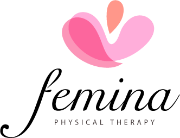Haga clic aquí para la versión española Sex Without Pain: A Self-Treatment Guide To The Sex Life You Deserve was written by Heather Jeffcoat, DPT, a physical therapist with countless successes in treating pain of this type. Women with vaginismus, overactive pelvic floor, painful intercourse, vulvodynia, vulvar vestibulitis, vestibulodynia, dyspareunia, interstitial cystitis have all benefited from her unique program. Heather uses her orthopedic background to approach treatment of these muscles like they are....muscles! She utilizes a self-treatment tool called a dilator to provide massage and other muscle relaxation and stretching techniques in a gentle fashion to return a women's muscles back to a resting, rather than guarded, state.
• To order "Sex Without Pain" in paperback from Amazon for $24.99, click here.
• To order an electronic read-only non-printable PDF copy of the book for instant download at $19.99, use the button below:

• To schedule an appointment at one of the Femina PT offices, click here.
• For a list of other trusted health care providers, click here.










 Start Your Pelvic Health Journey
Start Your Pelvic Health Journey


